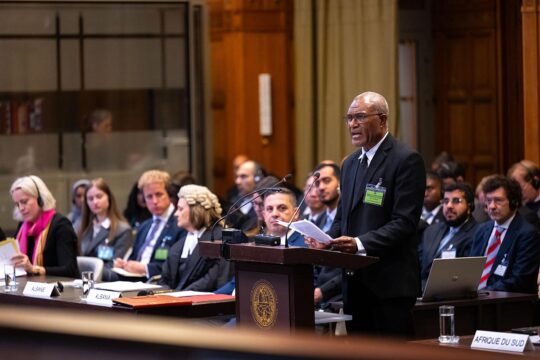In a sweeping decision the world's top court on Wednesday declared climate change an "existential problem of planetary proportions" and said countries had a legal duty to act or face consequences.
The highly anticipated International Court of Justice advisory opinion is not legally binding but was unanimous and expected to have major legal ramifications for courts, companies and communities across the world.
The United Nations had tasked the ICJ to say what obligations countries were under to curb planet-heating emissions -- and to lay out possible consequences for failing to do so.
Here are some highlights from a summary of the opinion read by ICJ president Yuji Iwasawa on behalf of the 15-judge panel in The Hague:
Big picture
Iwasawa said the court could only address the questions put to it by the UN within its legal remit, but noted that the issues go beyond the law.
"They concern an existential problem of planetary proportions that imperils all forms of life, and the very health of our planet," he said.
"A complete solution to this daunting and self-inflicted problem requires the contribution of all fields of human knowledge whether law, science, economics... in order to secure a future for ourselves and those who are yet to come."
On the right to a healthy climate
"With regard to the duty to prevent significant harm to the environment, the court considers that it also applies to the climate system, which is an integral and vitally important part of the environment and which must be protected for present and future generations."
The court said climate impacts like sea level rise, drought, desertification and weather disasters "may significantly impair the enjoyment of certain human rights, including the right to life".
What are countries' duties to cut emissions?
The court said countries had binding legal obligations under the UN's climate negotiations framework as well as in customary law.
Each party to these agreements needs to produce climate plans that "represent its highest possible ambition".
And all climate plans taken together should be "capable of achieving the temperature goal of limiting global warming to 1.5 degrees Celsius above pre-industrial levels".
"Non-compliance with emission reduction commitments by a state may constitute an internationally wrongful act," the court said.
What about fossil fuels?
This was quite explicit: "Failure of a state to take appropriate action to protect the climate system from GHG (greenhouse gas) emissions, including through fossil fuel production, fossil fuel consumption, the granting of fossil fuel exploration licences, or the provision of fossil fuel subsidies may constitute an internationally wrongful act which is attributable to that state."
On reparations
This is the most controversial aspect of the questions considered by the court.
It said that a state responsible for an internationally wrongful act is under an obligation to cease that act, provide assurances that it will not happen again and could include "full reparation to injured states in the form of restitution, compensation and satisfaction".
This was provided that "a sufficiently direct and certain causal nexus can be shown between the wrongful act and injury", the court added.
It said that while finding a causal link between the emissions of one country and the harm in another was "more tenuous than in the case of local sources of pollution, this does not mean that the identification of a causal link is impossible in the climate change context".
Restitution, it said "may take the form of reconstructing damaged or destroyed infrastructure, and restoring ecosystems and biodiversity".





